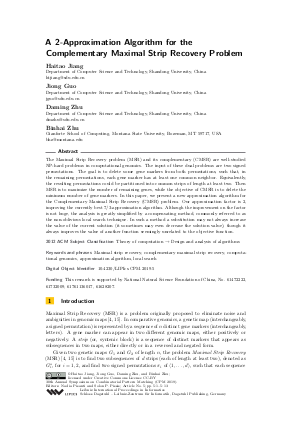A 2-Approximation Algorithm for the Complementary Maximal Strip Recovery Problem
Authors Haitao Jiang, Jiong Guo, Daming Zhu, Binhai Zhu
-
Part of:
Volume:
30th Annual Symposium on Combinatorial Pattern Matching (CPM 2019)
Part of: Series: Leibniz International Proceedings in Informatics (LIPIcs)
Part of: Conference: Annual Symposium on Combinatorial Pattern Matching (CPM) - License:
 Creative Commons Attribution 3.0 Unported license
Creative Commons Attribution 3.0 Unported license
- Publication Date: 2019-06-06
File

PDF
LIPIcs.CPM.2019.5.pdf
- Filesize: 485 kB
- 13 pages
Document Identifiers
Subject Classification
ACM Subject Classification
- Theory of computation → Design and analysis of algorithms
Keywords
- Maximal strip recovery
- complementary maximal strip recovery
- computational genomics
- approximation algorithm
- local search
Metrics
- Access Statistics
-
Total Accesses (updated on a weekly basis)
0Document
0Metadata
Abstract
The Maximal Strip Recovery problem (MSR) and its complementary (CMSR) are well-studied NP-hard problems in computational genomics. The input of these dual problems are two signed permutations. The goal is to delete some gene markers from both permutations, such that, in the remaining permutations, each gene marker has at least one common neighbor. Equivalently, the resulting permutations could be partitioned into common strips of length at least two. Then MSR is to maximize the number of remaining genes, while the objective of CMSR is to delete the minimum number of gene markers. In this paper, we present a new approximation algorithm for the Complementary Maximal Strip Recovery (CMSR) problem. Our approximation factor is 2, improving the currently best 7/3-approximation algorithm. Although the improvement on the factor is not huge, the analysis is greatly simplified by a compensating method, commonly referred to as the non-oblivious local search technique. In such a method a substitution may not always increase the value of the current solution (it sometimes may even decrease the solution value), though it always improves the value of another function seemingly unrelated to the objective function.
Cite As Get BibTex
Haitao Jiang, Jiong Guo, Daming Zhu, and Binhai Zhu. A 2-Approximation Algorithm for the Complementary Maximal Strip Recovery Problem. In 30th Annual Symposium on Combinatorial Pattern Matching (CPM 2019). Leibniz International Proceedings in Informatics (LIPIcs), Volume 128, pp. 5:1-5:13, Schloss Dagstuhl – Leibniz-Zentrum für Informatik (2019)
https://doi.org/10.4230/LIPIcs.CPM.2019.5
BibTex
@InProceedings{jiang_et_al:LIPIcs.CPM.2019.5,
author = {Jiang, Haitao and Guo, Jiong and Zhu, Daming and Zhu, Binhai},
title = {{A 2-Approximation Algorithm for the Complementary Maximal Strip Recovery Problem}},
booktitle = {30th Annual Symposium on Combinatorial Pattern Matching (CPM 2019)},
pages = {5:1--5:13},
series = {Leibniz International Proceedings in Informatics (LIPIcs)},
ISBN = {978-3-95977-103-0},
ISSN = {1868-8969},
year = {2019},
volume = {128},
editor = {Pisanti, Nadia and P. Pissis, Solon},
publisher = {Schloss Dagstuhl -- Leibniz-Zentrum f{\"u}r Informatik},
address = {Dagstuhl, Germany},
URL = {https://drops.dagstuhl.de/entities/document/10.4230/LIPIcs.CPM.2019.5},
URN = {urn:nbn:de:0030-drops-104769},
doi = {10.4230/LIPIcs.CPM.2019.5},
annote = {Keywords: Maximal strip recovery, complementary maximal strip recovery, computational genomics, approximation algorithm, local search}
}
Author Details
Funding
This research is supported by National Natural Science Foundation of China, No. 61472222, 61732009, 61761136017, 61628207.
References
- Laurent Bulteau, Guillaume Fertin, Minghui Jiang, and Irena Rusu. Tractability and approximability of maximal strip recovery. Theoretical Computer Science, 440-441:14-28, 2012. URL: http://dx.doi.org/10.1016/j.tcs.2012.04.034.
- Laurent Bulteau, Guillaume Fertin, and Irena Rusu. Maximal Strip Recovery Problem with Gaps: Hardness and Approximation Algorithms. In Algorithms and Computation, 20th International Symposium, ISAAC 2009, Honolulu, Hawaii, USA, December 16-18, 2009. Proceedings, pages 710-719, 2009. URL: http://dx.doi.org/10.1007/978-3-642-10631-6_72.
- Zhixiang Chen, Bin Fu, Minghui Jiang, and Binhai Zhu. On recovering syntenic blocks from comparative maps. Journal of Combinatorial Optimization, 18(3):307-318, 2009. URL: http://dx.doi.org/10.1007/s10878-009-9233-x.
- Vicky Choi, Chunfang Zheng, Qian Zhu, and David Sankoff. Algorithms for the Extraction of Synteny Blocks from Comparative Maps. In Algorithms in Bioinformatics, 7th International Workshop, WABI 2007, Philadelphia, PA, USA, September 8-9, 2007, Proceedings, pages 277-288, 2007. URL: http://dx.doi.org/10.1007/978-3-540-74126-8_26.
-
M. R. Garey and David S. Johnson. Computers and Intractability: A Guide to the Theory of NP-Completeness. W. H. Freeman, 1979.

- Shuai Hu, Wenjun Li, and Jianxin Wang. An Improved Kernel for the Complementary Maximal Strip Recovery Problem. In Computing and Combinatorics - 21st International Conference, COCOON 2015, Beijing, China, August 4-6, 2015, Proceedings, pages 601-608, 2015. URL: http://dx.doi.org/10.1007/978-3-319-21398-9_47.
- Haitao Jiang, Zhong Li, Guohui Lin, Lusheng Wang, and Binhai Zhu. Exact and approximation algorithms for the complementary maximal strip recovery problem. Journal of Combinatorial Optimization, 23(4):493-506, 2012. URL: http://dx.doi.org/10.1007/s10878-010-9366-y.
- Haitao Jiang and Binhai Zhu. A linear kernel for the complementary maximal strip recovery problem. Journal of Computer and System Sciences, 80(7):1350-1358, 2014. URL: http://dx.doi.org/10.1016/j.jcss.2014.03.005.
- Minghui Jiang. Inapproximability of Maximal Strip Recovery. In Algorithms and Computation, 20th International Symposium, ISAAC 2009, Honolulu, Hawaii, USA, December 16-18, 2009. Proceedings, pages 616-625, 2009. URL: http://dx.doi.org/10.1007/978-3-642-10631-6_63.
- Minghui Jiang. Inapproximability of Maximal Strip Recovery: II. In Frontiers in Algorithmics, 4th International Workshop, FAW 2010, Wuhan, China, August 11-13, 2010. Proceedings, pages 53-64, 2010. URL: http://dx.doi.org/10.1007/978-3-642-14553-7_8.
- Sanjeev Khanna, Rajeev Motwani, Madhu Sudan, and Umesh V. Vazirani. On Syntactic versus Computational Views of Approximability. SIAM Journal on Computing, 28(1):164-191, 1998. URL: http://dx.doi.org/10.1137/S0097539795286612.
- Wenjun Li, Haiyan Liu, Jianxin Wang, Lingyun Xiang, and Yongjie Yang. A 42k Kernel for the Complementary Maximal Strip Recovery Problem. In Frontiers in Algorithmics - 11th International Workshop, FAW 2017, Chengdu, China, June 23-25, 2017, Proceedings, pages 175-186, 2017. URL: http://dx.doi.org/10.1007/978-3-319-59605-1_16.
- Guohui Lin, Randy Goebel, Zhong Li, and Lusheng Wang. An improved approximation algorithm for the complementary maximal strip recovery problem. Journal of Computer and System Sciences, 78(3):720-730, 2012. URL: http://dx.doi.org/10.1016/j.jcss.2011.10.014.
- Lusheng Wang and Binhai Zhu. On the Tractability of Maximal Strip Recovery. Journal of Computational Biology, 17(7):907-914, 2010. (Correction: 18(1):129, Jan, 2011). URL: http://dx.doi.org/10.1089/cmb.2009.0084.
- Chunfang Zheng, Qian Zhu, and David Sankoff. Removing Noise and Ambiguities from Comparative Maps in Rearrangement Analysis. IEEE/ACM Transactions on Computational Biology and Bioinformatics, 4(4):515-522, 2007. URL: http://dx.doi.org/10.1145/1322075.1322077.
